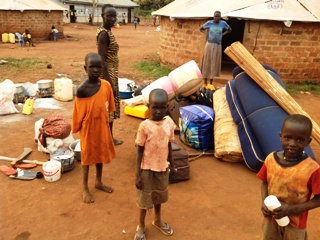Uganda: South Sudanese refugees turn to agriculture for survival
March 6, 2016 (KIRYANDONGO) – South Sudanese refugees in resettlement camps in Uganda have turned to agriculture to raise incomes for school needs for their children.

James Maker Ter, is one of those who wakes up every day to go to clear weed from his farm. During holidays, Maker and his five children struggle to expand agricultural farms.
“I see this land has a lot of opportunities and I have decided to cultivate and I know doing this job will strengthen me, although the UNHCR [ United Nations refugee agency] is supporting me. I have to do more in order to support my family,” he told Sudan Tribune.
Last year, Maker produced 50 bags of maize, each weighing an estimated 50 kilograms.
He however remains optimistic he could produce more bags of maize this year.
Out of the 50 bags of maize, Maker disclosed that he sold 20 sacks of what he cultivated to help him buy school uniforms for his children and cater for the family’s medical bills.
He encouraged South Sudanese refugees in the displaced camps to take up hoes and begin cultivation. An economic activity like farming, he said, does not require lots of capital.
“When you produce more food, you will not have any problem. By engaging yourself into agriculture is likely to make you richer. If you sell clothes it may not work out in the hunger time, but if you have more grain stored and then your business can still boom,” said Maker.
Mary Nyaber Koryom, a 35 year-old South Sudanese refugee’s, who takes care of 10 children in the house says agriculture was her last option in the displaced peoples’ camp.
She says it has not been easy to cater for children’s needs like school uniforms and fees.
“We have so many challenges to do this job. We lack tractors and buying pesticide become very expensive. We lack support to practice agriculture; we do this work for the sake of our own surviving in the camp,” she said.
(ST)
